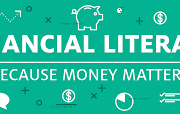Alice Robertson http://tidyhome.info/
No one’s born knowing how to handle money. For most people, financial literacy is a winding road of trial and error, peppered with self-doubt, false starts, and internalized baggage. The good news? You can change your money mindset. You can start where you are—regardless of your income or past mistakes—and build a foundation that fuels your goals instead of burying them. But to do that, you need to unpack the mental roadblocks sabotaging your financial progress and rewire your thinking for clarity, confidence, and consistency.
How Your Brain Undermines Your Wallet
Even the smartest people make dumb money decisions sometimes, and it’s often thanks to invisible mental traps. One of the most common is present bias, which leads you to prioritize small rewards now (like a new gadget or night out) over bigger payoffs later, such as a growing savings account or debt freedom. Then there’s recency bias—when you overreact to new financial information, like a stock dip or economic headline, and make emotional decisions that derail your plan. Confidence isn’t always your ally, either.
Overconfidence bias convinces you that you’re better at managing money than you really are, leading to risky investments or poor budgeting. On the flip side, loss aversion makes you cling to every dollar, avoiding necessary risks like career changes or investments that could lead to long-term gain. Awareness of these biases won’t make them vanish, but it’ll help you pause, recalibrate, and make more rational choices.
Boost Income Through Education
One of the most dependable ways to increase your earning potential is by investing in your education. Earning a degree can help you qualify for better-paying roles, transition into a new field, or climb the ladder in your current career. Online degree programs make this easier than ever, allowing you to study around a full-time job or take care of family without sacrificing your future. If you’re already a nurse, advancing your education through an RN to BSN online program can deepen your clinical expertise and broaden your professional opportunities.
Repair and Rebuild Your Credit Health
A damaged credit score doesn’t have to be a life sentence. You can rebuild, and it starts with knowing what’s hurting you. Check your credit report for errors or outdated accounts, and dispute anything that doesn’t belong. Start paying everything on time—even minimums count. Keep your credit utilization low and avoid opening too many new accounts at once. If you’re starting from scratch or recovering from bankruptcy, consider secured credit cards or credit-builder loans. Good credit is about patterns, not perfection, and those patterns start with small, steady actions.
Create a Positive Money Mindset
Shifting to a healthier money mindset starts with forgiveness. Yes, really—if you’re still punishing yourself for credit card debt, career missteps, or missed opportunities, you’re not moving forward. Letting go doesn’t mean ignoring the past; it means learning from it without letting it define you. Understanding your emotional patterns around money is another powerful tool. Maybe spending gives you a temporary high or makes you feel in control when life’s chaotic. Maybe scarcity messages from childhood still echo in your brain, whispering that there’s never enough. Once you name those patterns, you can challenge them.
Practice Makes Permanent
New mindsets are built through new habits. Start by creating small, doable money practices that feel realistic, not punishing. Automate your savings—even $10 a week builds momentum. Set calendar reminders for reviewing your budget or tracking expenses. Journal about your spending choices to understand what triggers impulse buys. Try a weekly financial check-in where you reflect on wins, losses, and lessons. These aren’t about perfection; they’re about building consistency. Habits are where mindset becomes action.
Earn More by Thinking Differently
You don’t have to work 90-hour weeks or start a side hustle to make more money—though those are options. The real trick is to look at your existing skillset and ask, “Where is there demand for this?” Can you freelance consult, teach, or coach? Can you take on a project at work that boosts your visibility or gets you closer to a raise? Start thinking in terms of value, not just time. Upskilling through online courses or certifications can also open doors without breaking the bank. And don’t underestimate networking. Sometimes, the fastest path to earning more is through a relationship that leads to your next big opportunity.
Smarter Saving Starts Small Saving money is less about math and more about behavior. Create a budget that reflects your actual life, not an idealized one you’ll never stick to. Build in small joys so you don’t binge-spend after weeks of deprivation. Use separate accounts to physically separate your savings from your spending money—out of sight, out of temptation. Try apps that round up your purchases and stash the difference or that analyze your bills for unnecessary subscriptions. And if saving feels boring or pointless, tie it to a dream: a trip, a down payment, financial freedom. Motivation matters.
The most important thing to remember is that your financial identity is not fixed. You’re not doomed to repeat your parents’ mistakes or be stuck at your current income level forever. Your thoughts shape your actions, and your actions shape your results. Changing your money mindset isn’t about becoming a finance guru overnight—it’s about committing to learning, to growing, and to believing that you are worth the effort. Because you are. Discover the heartbeat of Southeast Missouri with Semo Urban Voices, where community stories and local insights come alive!

































